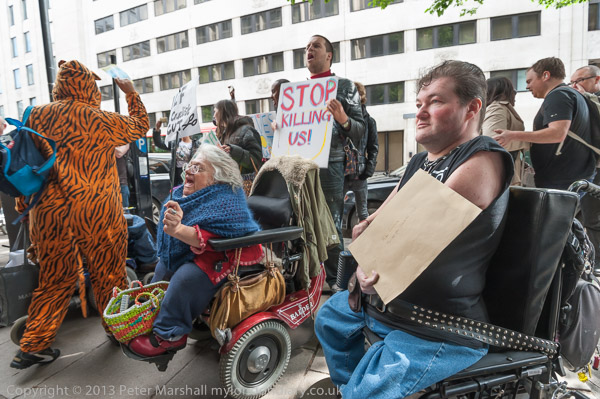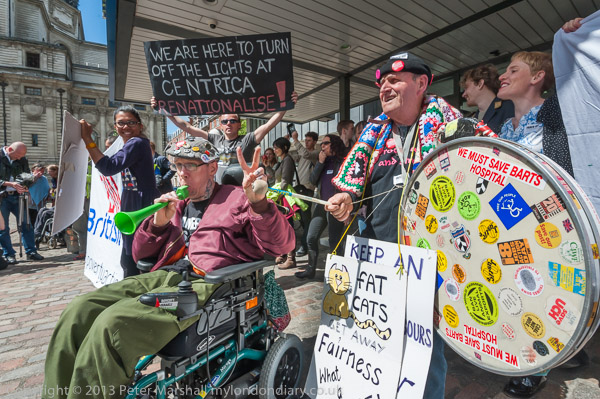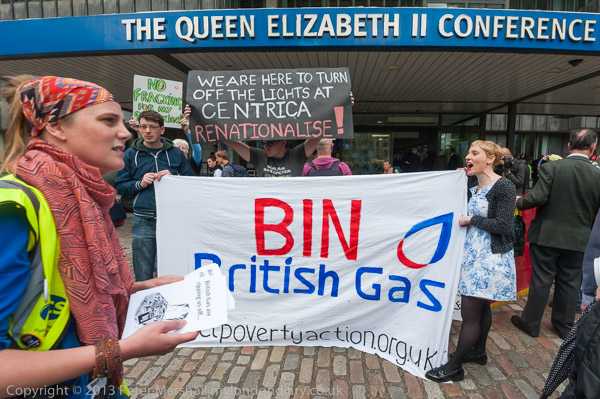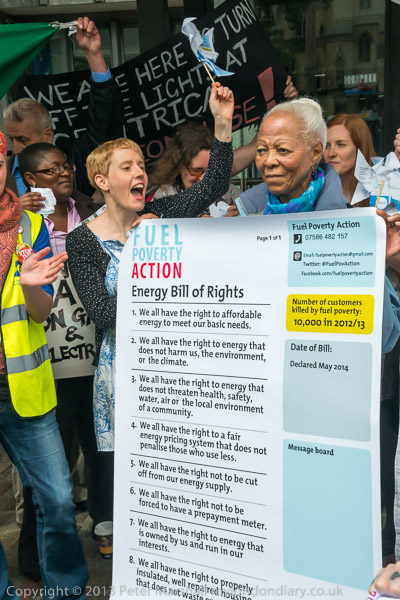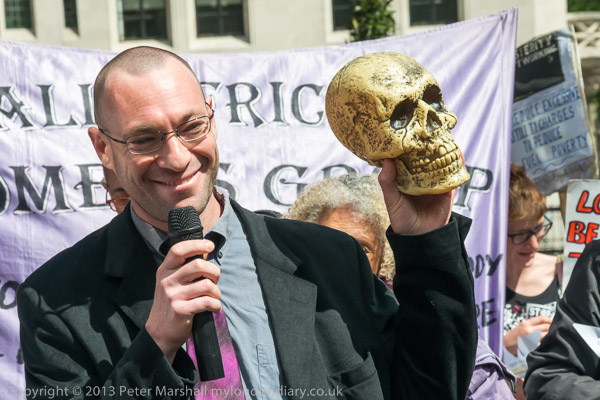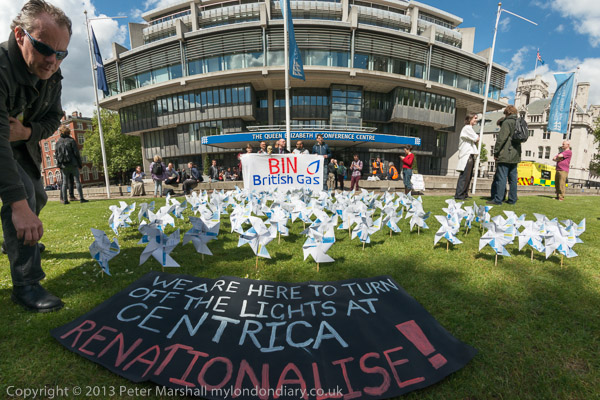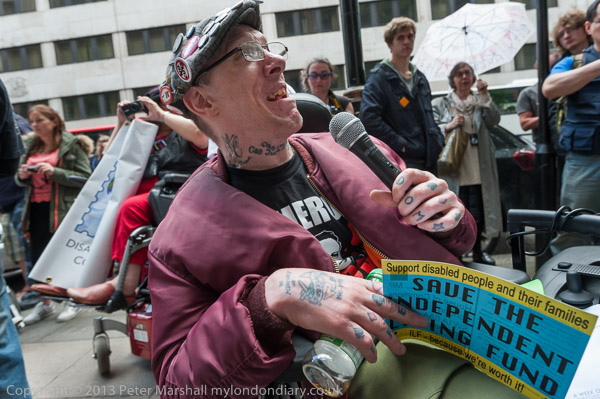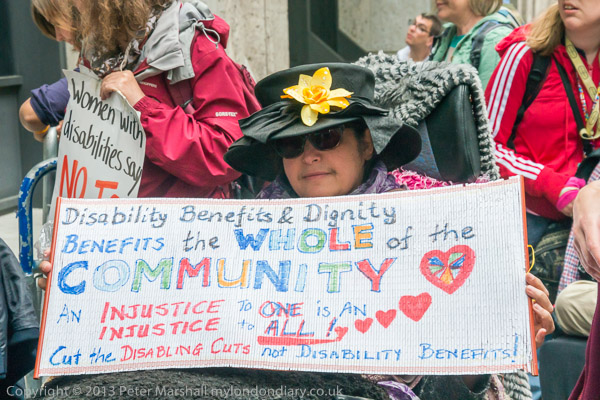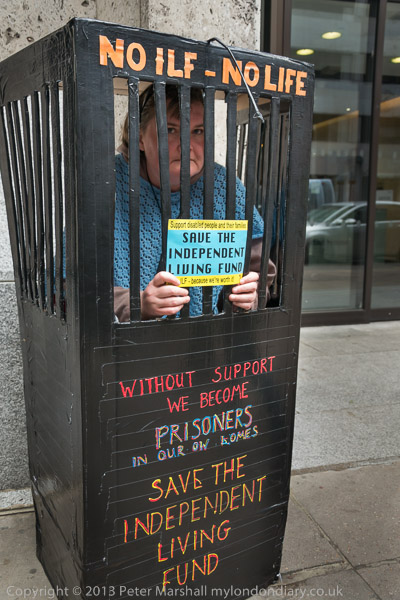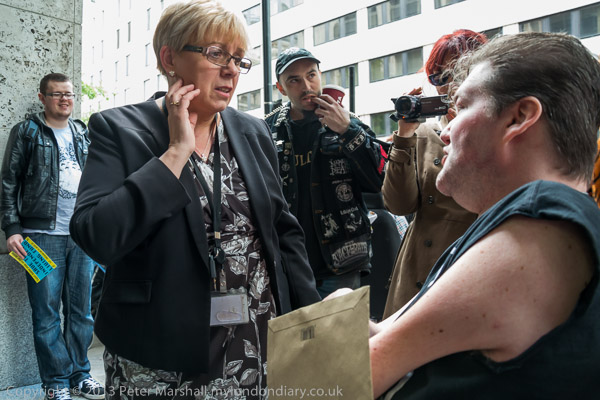Fuel Poverty, NHS Staffing, Zero Hours – Three protests in London on Tuesday 26th November 2013 about issues that are still very much with us – and which have got worse since ten years ago today.
Justice Not Jumpers at NPower HQ – City
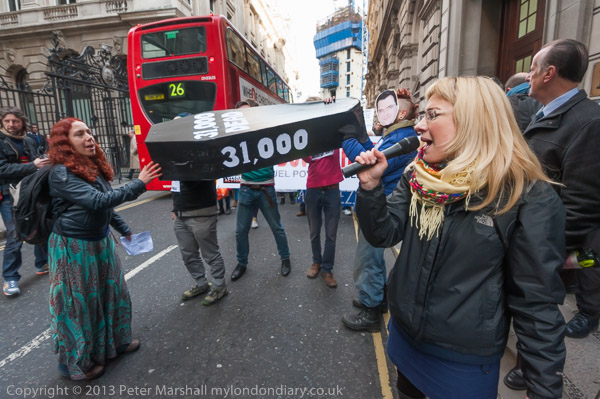
Ten years ago fuel poverty activists were protesting that profiteering by the major energy providers was leading to many people having to chose between eating and keeping warm, causing many unnecessary deaths. They protested to draw attention to the scandal of energy companies making huge profits and avoiding taxes while many died because of their greed.
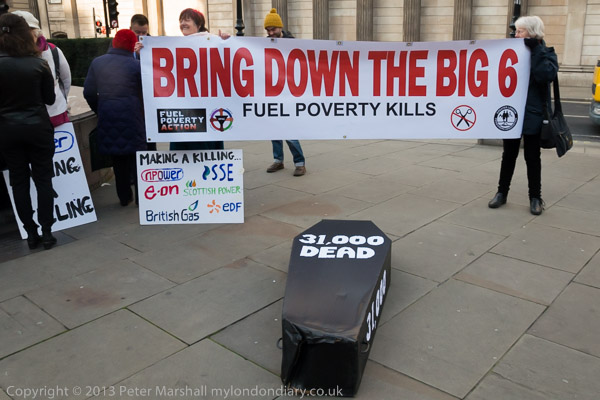
The protest came on the day that figures were announced for ‘excess winter deaths’, of which at least 30% are due to cold homes. The previous year the figure had been around 24,000 but that announced on the day of the protest came as a shock, having increased by around a third to 31,000.
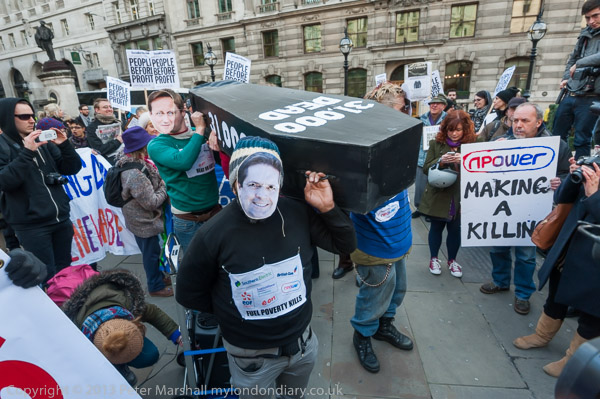
The protest in London was one of several around the country including at British Gas’s new Oxford HQ, as well as in Lewes and Bristol. NPower had been chosen for the London protest for its poor record of customer complaints and for having made larger price rises in that year than the other Big Six companies – 9.3% electricity and 11.1% gas.
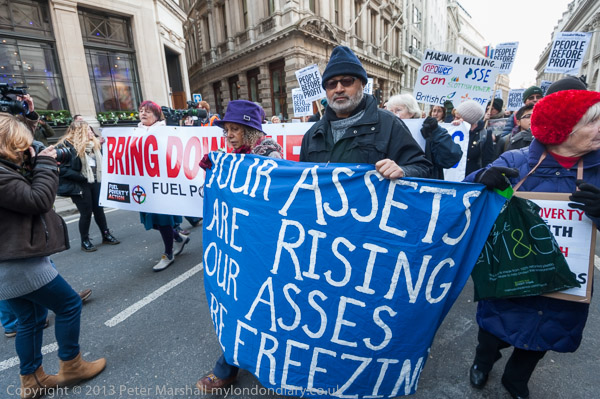
The companies defend the price rises, spreading the lie that ‘green taxes’ were to blame, though these are a relatively minor factor in costs. The real problem is that privatisation means that large amounts are taken from our bills to pay to shareholders on top of the increasing costs of dirty fossil fuels.
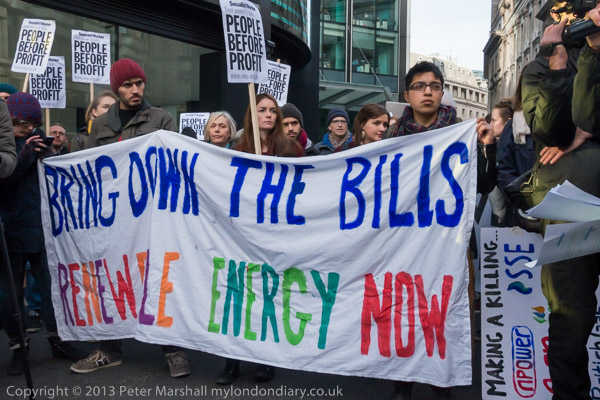
NPower takes 5p in every pound we pay as profit and welcomes increasing costs as this adds to their profits which rose by over a third to £413 million in the previous winter when its price hikes pushed an estimate 300,000 more people into fuel poverty. Despite its huge profits the company had managed to avoid paying any corporation tax for the past three years.
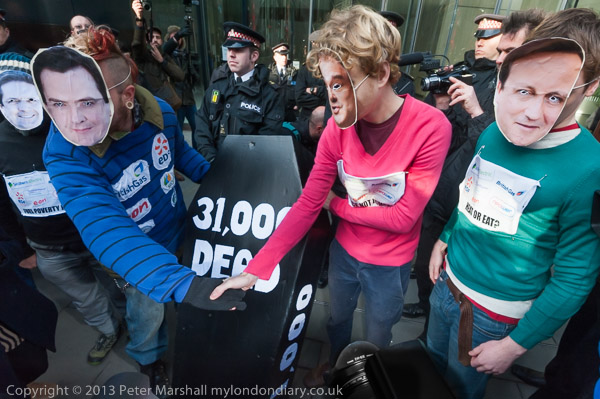
Protesters met at Bank for a funeral procession around the City streets to the NPower offices in Throgmorton St with a coffin being carried by pallbears with masks including those of Prime Minister David Cameron and Chancellor George Osborn and wearing jumpers with the logos of the major energy companies.
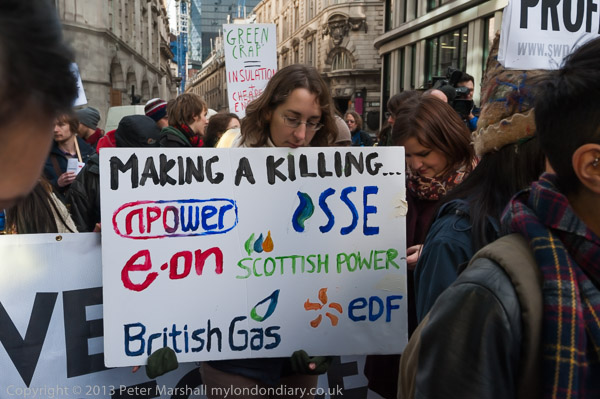
At the NPower offices they lowered the coffin in front of the row of police protecting the building and a rally took place on the street. One of the first speakers was Andy Greene of Disabled People Against Cuts, who spoke of the effects the energy price rises were having, causing great hardship to many disabled people. Testimonies were then read from many individuals how they had to choose between heating and eating; many were already cold and dreading the coming winter.
More pictures at Justice Not Jumpers at NPower HQ.
4:1 legal minimum NHS staffing – Dept of Health, Whitehall
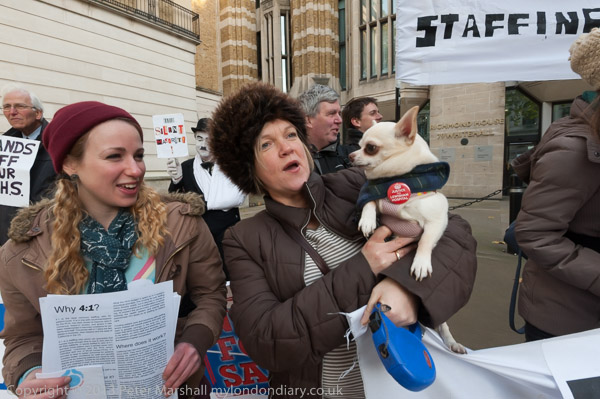
Nurses began the 4:1 campaign to draw attention to the crisis of staffing in the NHS where there were then over 20,000 nursing vacancies and to the Department of Health’s decision to downgrade 100 A&E departments, effectively closing them. They called for a mandatory staffing level of one nurse for every 4 patients in the NHS.
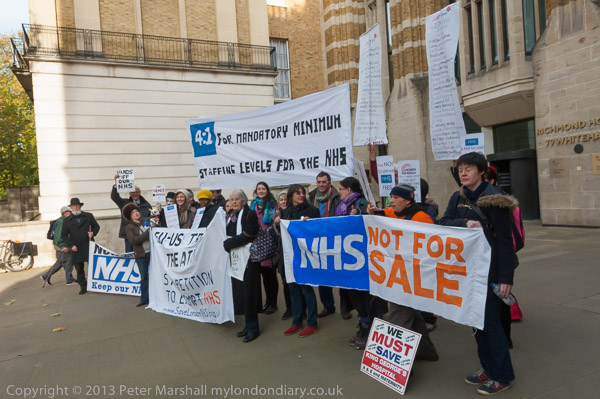
The campaign stated “The public have had enough of overworked staff, unprecedented avoidable death rates and negative press about the NHS. The public and nurses alike know the value of the NHS, and want to see it perform to its best, providing the dignified care patients deserve.“
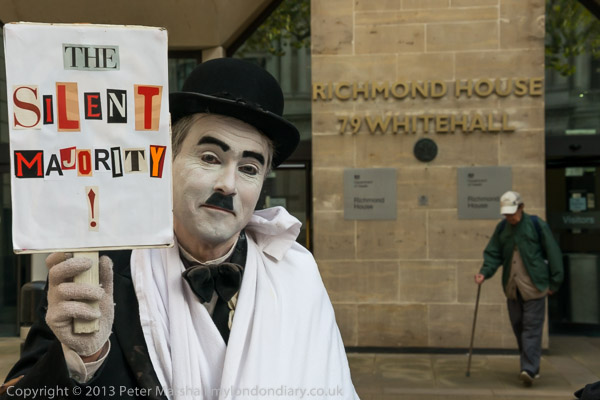
They were joined in the protest outside the Ministry of Health, then in Richmond House in Whitehall, by other groups concerned about the future of the NHS, including those pointing out the threat to the NHS of the EU-US Trade Treaty, which would open up the whole of the NHS to privatisation.
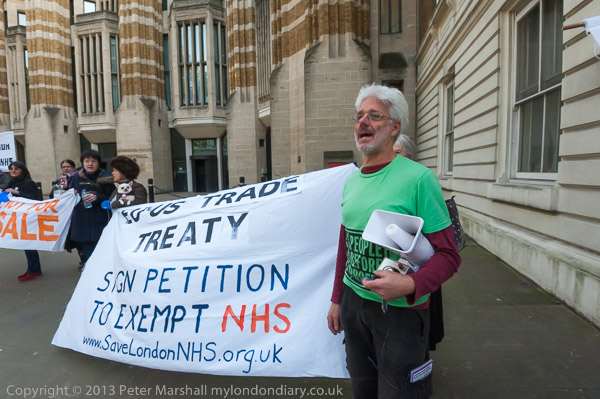
They were joined by campaigners against the planned closure of many A&E units across the country and by those fighting to save hospitals including at Lewisham and King George V in Redbridge, as well as those with more general concerns about the future of the NHS.
4:1 legal minimum NHS staffing
Cultural Workers against Zero Hours – Millennium Bridge
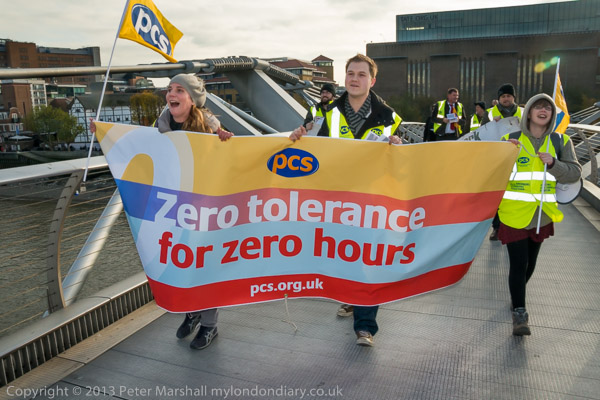
PCS members from national cultural institutions in London staged a protest at Tate Modern and on the Millennium Bridge against zero hour contracts which gave them no guaranteed weekly hours or income, while stopping them taking on other work.
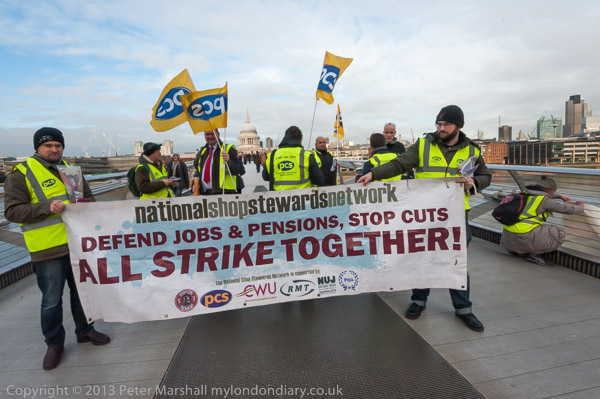
The number of workers on zero hours contracts more than doubled from around 250,000 in 2012 to around 600,000 in 2013, and since then has continued to increase to around 1.18 million in 2023, over 3% of the total workforce. Although legal in the UK, zero hours contracts are inherently unfair on workers and an exploitation of labour. Labour had pledged to outlaw them, but if they get into government with Starmer as leader we are unlikely to get fairer labour laws.
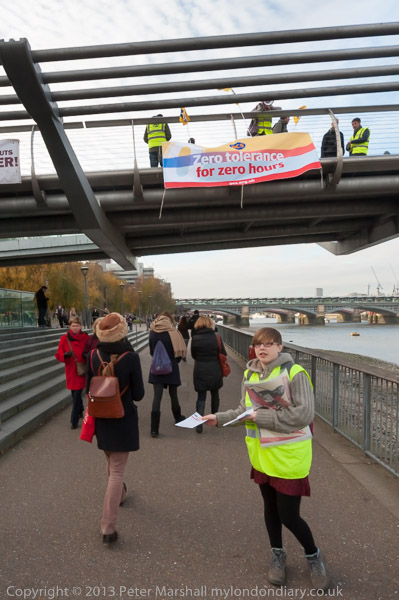
Employers use zero-hour contracts to cut wages, avoid holiday pay, pensions, and ensure the maximum flexibility and profit for themselves. Many on zero hours contracts in 2013 were also prevented from taking on other part-time work, as they were often obliged to be available for work at the whim of the employer.
The law was changed in 2015 to make contracts which stopped workers from having other part-time jobs. But although in theory workers are not obliged to accept any work offered, in practice should they refuse hours offered for any reason they know that they will be treated less favourably by the employer in the future, often severely discriminated against.
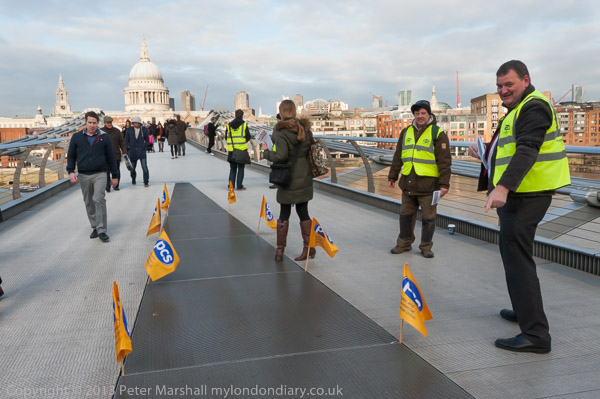
Zero hours contracts were initially designed for use in very limited and specific circumstances where there use might be justified but are now a widespread form of exploitation. The PCS (and other trade unions) “believe that guaranteed hours, a living wage, holiday and sick pay, respect for employment rights, and dignity and respect at work should be fundamental entitlements for all workers.”
Cultural Workers against Zero Hours
